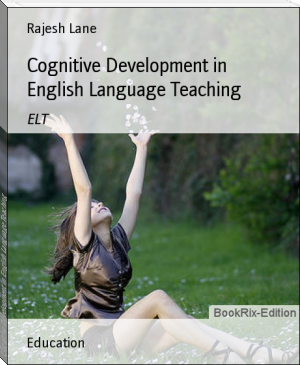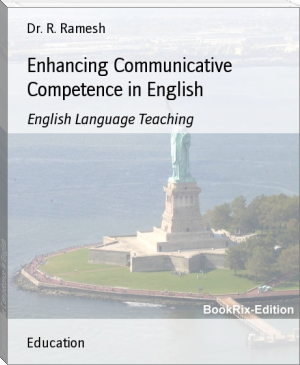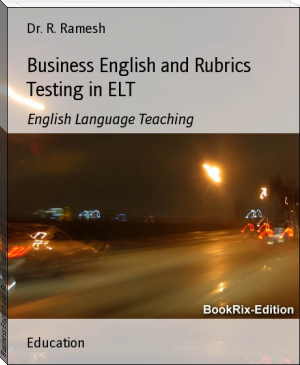Cognitive Development in English Language Teaching by Rajesh Lane (ereader android .txt) 📖

- Author: Rajesh Lane
Book online «Cognitive Development in English Language Teaching by Rajesh Lane (ereader android .txt) 📖». Author Rajesh Lane
Teacher can facilitate learner’s creativity by adapting the techniques of the Role Play, Simulation, Mind-map, Story telling and speech events.
According to Charles Mc Hugh, Role Play activities offer the maximum chances of acquiring foreign language skills in a classroom setting:
Besides the simulation exercise in terms of linguistic skills, is the improvisation exercise where students are allowed the greatest amount of freedom of creativity, They may be asked to interpret and cope with a specific situation by either given no specific guidelines at all or only procedural guidelines. (Language use Language Teaching and The Curriculum, 291).
Simulation is whereon the participants explore their feelings, anxieties and attitudes toward the other group in language learning.
Researcher’s hypothesis intends to adopt these techniques to frame the context with emergent themes in emergent syllabus.
CHAPTER THREE
COGNITIVE DEVELOPMENT IN THE CLASSROOM
In the previous chapter the role of emergent syllabus was discussed. It provides the room for cognitive development for learners. In this chapter, how the cognitive development takes place in the classroom is discussed.
It has been presumed that the learners at the U . G level should have
developed the required amount of cognition to cope up with any situation . Happy classroom atmosphere should be created to the learners to get rid of archaic conventions or rules.
The teacher can facilitate the context in the classroom to improve learner’s cognition. A friendly atmosphere between the teacher and the students is essentially needed. Otherwise the students may feel as fish out of water or as if under the sword of Democles. Classroom negotiation between the teacher and the learner and with peer group can urge the learner’s cognition to acquire second language effectively and leads to possible creativity. The communicative or the negotiation process between the teacher and the learner and among peer-group can be elucidated as given below.
Cognitive development in the classroom requires the exchange of information to improve the quality of communication. Teacher-framed and learner-framed contexts of interactions are needed to achieve the task.
In the teacher-framed context the teacher circulates emergent themes of context and learner interacts in the context. In the learner-framed context the learner himself produces the context among his / her peer group and speak on the theme. It makes the learner to be a problem-solver and helps to expand his/her cognition. Learners and produce by using their cognition which were acquired earlier and deal successfully with their emotive-meaning efficiently. It will give a persuasive effect on the part of the audience.
This process of cognitive development induces the learner to perform well; and it insists to acquire from newspapers, journals, the scientific inventions, discoveries, technology, incidents and accidents in and around the world; and it improves the curiosity to acquire matter from the web world, Television and from other sources. Unconsciously the learner participates in the development of the four skills of Listing, Speaking, Reading and Writing. The learner acquires metacognition or informations before entering into the class. It makes learner as a problem-solver and producer. According to the context, the learner’s mind produces a cognitive-map which includes the informations about the theme. For example if the context is “cloning“; sub-conciously, learner’s metacognition comes together in his mind; that may be illustrated as follows.
The aforesaid cognitive-map includes the learner’s ability to interact efficiently. Each learner brings different cognitive-maps into the classroom. Language is a medium through which s / he has to communicative.
Teacher plays in the role of facilitator and has to make space for the learner with relevant context. The deeds of the teacher in the classroom are; identifying learner’s needs, organizing language acquisition opportunities and measuring student’s achievement.
The Learner and the teacher collaboratively plan the goals, context, activities, settings, learner-role and teacher-role in the acquisition and creative process of cognitive development task.
The goal of language acquisition is to urge the creative process. Cognitive development for effective communication breaks the communication barriers or misunderstanding according to the context.
Participants of the study:
Twenty five Tamil speaking III year U.G level learners for whom English remains second language, were selected to participate in the study. In this study, comprehensive English language test and language proficiency interview were conducted to understand their effective language proficiency and their acceptability of developing cognition.
Learners were asked to speak and write on a specific context and those materials were used as samples for this study. From those samples Researcher could find out the following problems in using English at the
U . G level;
( a ) Apprehension on grammar mistakes while speaking
( b ) Limited exposure towards English
( c ) Unawareness of contextual usage of language
( d ) Lack of creativity
(e) Misundersanding in using “ Could have…….”, “ Might have beaten “, “ So did she “, “ Keep on “, “ dare “, “ If……have beaten “, “ If……did “, “If……beat “, “ Thanking you “, “ Let……Lets “, “ Riot…….Ryot “ , etc…
These mistakes caused due to poor understanding by the learners were encountered by the researcher. These mistakes were not considered as mistakes. Because learners were not aware of the contextual use of words. When their language was contextualized they could acquire the contextual use of words. In this attempt emergent themes were circulated to ameliorate their creativity. The researcher used both teacher- created and learner-created contexts in the classroom. Emotions were freely allowed to discuss the context.
The following techniques or activities were used to frame the emergent context to improve the learner’s cognition:
( a ) Information gap activities:
Information gap activities aim to improve speaking skill. It includes,
( i ) Getting to know each other:
Here the students are grouped in pairs, and they interview each other and introduce his / her partner to the class.
( ii ) Partner Puzzle:
Many copies of picture are cut up and put
 The desire to acquire knowledge about the surrounding world and human society is quite natural and understandable for a person. Life is so developed that an uneducated person will never occupy a high position in any field. Humanity in its mass, and each person individually, develops objectively, regardless of certain life circumstances and obstacles, but with different intensity. The speed of development depends on the quality of training.
The desire to acquire knowledge about the surrounding world and human society is quite natural and understandable for a person. Life is so developed that an uneducated person will never occupy a high position in any field. Humanity in its mass, and each person individually, develops objectively, regardless of certain life circumstances and obstacles, but with different intensity. The speed of development depends on the quality of training.




Comments (0)